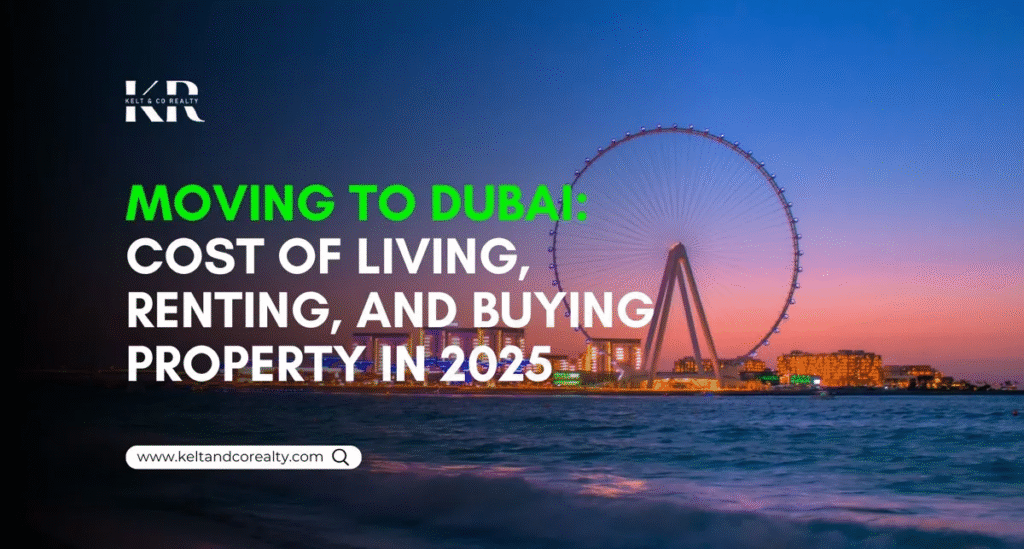
Buying vs Renting in Dubai: Picture yourself settling into a sleek Dubai Marina apartment or a sprawling Palm Jumeirah villa, weighing whether to buy and build wealth or rent and stay flexible, all while navigating Dubai’s tax-friendly landscape. In 2025, Dubai’s real estate market remains a global magnet, offering 100% freehold ownership and a tax structure that outshines cities like London or New York, where taxes can erode 15-40% of returns. The UAE’s dirham, pegged to the U.S. dollar, ensures currency stability, and residential purchases dodge 5% VAT, saving thousands.
With 58% of buyers from countries like the UK, India, and Russia driving 94,000 property transactions in the first half of 2025, Dubai’s 4-6% rental yields and 8-12% price appreciation surpass London (2-4%) or New York (3-4%). Properties over $545,000 qualify for a 10-year Golden Visa, while smaller units offer 2-year residency perks.
New tax rules, like the Domestic Minimum Top-up Tax (DMTT) and Qualifying Investment Fund (QIF) updates, affect corporate investors but leave individuals largely untouched. This guide compares buying versus renting in Dubai in 2025, focusing on tax differences, spotlighting projects like Palm Jumeirah Ocean Villas and Dubai Marina Coastal Towers, to help you decide which path maximizes your financial freedom.
Dubai’s tax advantages make it a haven for both buyers and renters. Buyers enjoy zero capital gains tax, no personal income tax on rentals, and no annual property taxes, saving $12,000-$280,000 yearly compared to markets like New York (1-2% property tax) or London (20-28% capital gains tax). A $2 million property yielding 5% ($100,000 annually) is tax-free for buyers, versus $55,000-$70,000 after taxes elsewhere.
Renters avoid these investment benefits but face no tenant-specific taxes, only paying rent and a 5% municipality fee ($2,400-$12,000 annually). Residential purchases dodge 5% VAT ($100,000), unlike commercial properties, and the 9% corporate tax spares individual landlords. Free zone companies save $1,000-$30,000 annually, and small business relief waives corporate tax for revenues under $816,000 until December 31, 2026. With 25 million tourists and a 5% population surge fueling 2-3% vacancy rates, Dubai’s tax model drives demand for both buying and renting.
The tax-free environment feels like a warm embrace for financial growth.
Buyers in Dubai benefit from zero capital gains tax, unchanged in 2025. Selling a $1.2 million Dubai Marina apartment for $1.5 million after 25% appreciation yields a $300,000 tax-free profit, saving $60,000-$84,000 compared to London or New York. A $4 million Palm Jumeirah villa sold for $5 million yields a $1 million tax-free gain, saving $200,000-$280,000.
This advantage, paired with 8-12% price appreciation, makes buying a wealth-building strategy. Renters miss this benefit, as they don’t own assets to sell, but avoid the upfront costs of ownership. The tax-free profit incentivizes buying, especially in high-demand areas like Dubai Marina and Palm Jumeirah, where low vacancy rates (2-3%) drive value.
Keeping every dirham of profit feels like a financial victory for buyers.
Buyers who lease out properties pay no personal income tax, unlike renters who gain no rental income. A $1.2 million Dubai Marina apartment yielding $48,000-$72,000 annually is tax-free, versus $26,400-$43,200 elsewhere, saving $21,600-$28,800. A $4 million Palm Jumeirah villa yielding $160,000-$240,000 saves $72,000-$96,000.
Buyers must register long-term leases with Ejari ($54-$136 annually) or short-term rentals with DTCM ($408-$816), but these are minor compared to tax savings. Renters pay rent without tax but miss passive income opportunities. Short-term rentals, leveraging 25 million tourists, boost yields by 10-20%, making buying more lucrative for income-focused investors.
Tax-free rental income feels like a monthly gift for property owners.
Buyers face no annual property taxes, saving $12,000-$24,000 yearly on a $1.2 million property or $40,000-$80,000 on a $4 million property, unlike New York (1-2%) or London (council tax up to 2%). Renters avoid these savings but also the responsibility of ownership costs like maintenance ($5,000-$25,000 annually) and a 5% municipality fee on rentals ($2,400-$12,000). Buyers’ tax-free status enhances long-term wealth, while renters enjoy flexibility without ongoing property expenses. This makes buying ideal for those seeking stability and renters better for those prioritizing mobility.
No property taxes feel like a weight lifted for buyers.

Residential purchases are VAT-exempt, saving buyers $60,000 on a $1.2 million apartment or $200,000 on a $4 million villa, unlike commercial properties or the UK’s stamp duty (up to 12%). Off-plan purchases may incur 5% VAT on developer fees ($20,000-$80,000), recoverable via Federal Tax Authority (FTA) registration ($500-$1,000).
Short-term rental buyers must register for VAT if revenue exceeds $102,041, charging 5% but claiming credits on expenses like DTCM fees ($408-$816). Renters face no VAT on lease agreements but pay a 5% municipality fee included in rent. Non-compliance risks fines up to $13,612, so buyers need diligent bookkeeping, while renters have simpler obligations.
The VAT exemption feels like a warm welcome for buyers.
Starting January 1, 2025, the DMTT imposes a 15% tax on multinational enterprises (MNEs) with global revenues over €750 million ($793 million). This affects corporate buyers managing large portfolios, not renters or individual buyers. A company leasing 10 properties with $1 million in rental income faces a 15% tax ($150,000), reducing net income to $850,000.
Individual buyers and renters remain unaffected, and free zone companies can avoid DMTT by meeting Qualified Free Zone Person (QFZP) criteria, saving $12,240-$61,200 on $122,400-$612,000 in income. QFZP setup costs are $2,000-$5,000, with annual fees of $1,000-$3,000. This rule preserves Dubai’s tax-free appeal for most buyers.
The DMTT feels like a corporate tweak, leaving individuals free to thrive.
Cabinet Decision No. 34 of 2025, effective Q2 2025, refines QIF and REIT rules. QIFs, including those investing in properties, stay exempt from corporate tax if real estate income is below 10% and ownership is diversified. If a QIF earns $1 million, with $200,000 from real estate, 80% ($160,000) faces 9% tax ($14,400). This impacts corporate buyers, not renters or individual buyers, who enjoy tax-free gains. Restructuring to maintain QIF exemptions costs $1,500-$4,000. Renters avoid these complexities, but buyers using QIFs must ensure compliance to maximize tax benefits.
QIF rules feel like a smart challenge for corporate buyers only.
Palm Jumeirah Ocean Villas by Nakheel, set for completion in Q2 2025, offer 4-6 bedroom villas ($3 million-$6 million) with 4-6% rental yields and 8-12% price growth. Buying a $4 million villa yields $160,000-$240,000 tax-free annually, versus $88,000-$144,000 elsewhere, saving $72,000-$96,000. Selling it for Roset for $5 million yields a $1 million tax-free profit, saving $200,000-$280,000. No property taxes save $40,000-$80,000 yearly.
Initial costs include a 4% DLD fee ($120,000-$240,000), 2% broker fee ($60,000-$120,000), and a 20/50/30 payment plan. Maintenance fees are $15,000-$25,000, with a 5% municipality fee ($8,000-$12,000). A QFZP saves $40,800-$61,200 on rental income. U.S. buyers deduct depreciation ($72,727-$109,091), saving up to $36,364. Renting a similar villa costs $160,000-$240,000 annually, with a 5% municipality fee ($8,000-$12,000) but no ownership benefits. Golden Visa eligibility applies for buyers.
Buying feels like a tax-free gateway to luxury and wealth.
Dubai Marina Coastal Towers by Emaar, set for completion in Q3 2025, offer 1-3 bedroom apartments ($816,750-$2.04 million) with 4-6% rental yields and 8-12% price growth. Buying a $1.2 million apartment yields $48,000-$72,000 tax-free, versus $26,400-$43,200 elsewhere, saving $21,600-$28,800. Selling it for $1.5 million yields a $300,000 tax-free profit, saving $60,000-$84,000.
No property taxes save $12,000-$24,000 yearly. Initial costs include a 4% DLD fee ($32,670-$81,675), 2% broker fee ($16,335-$40,838), and a 50/50 payment plan. Maintenance fees are $5,000-$12,000, with a 5% municipality fee ($2,400-$3,600). A QFZP saves $12,240-$18,360. Renting costs $48,000-$72,000 annually, with a 5% municipality fee ($2,400-$3,600). Golden Visa eligibility applies for buyers.
Buying feels like a vibrant, tax-free urban investment.
Buying a $2 million property incurs a 4% DLD fee ($80,000), 2% broker fee ($40,000), and a 10% deposit ($200,000). Flexible payment plans (50/50 or 20/50/30) spread costs, with 50-70% paid during construction. Annual maintenance fees are $5,000-$25,000, with a 5% municipality fee ($2,400-$12,000). Off-plan purchases may incur 5% VAT ($20,000-$80,000), recoverable via FTA registration. Renters pay $48,000-$240,000 annually, including a 5% municipality fee ($2,400-$12,000), with no upfront costs but no equity or tax-free gains. Gift transfers to shareholders reduce DLD fees to 0.125% ($2,500), saving $77,500.
Buying’s costs feel like a step toward tax-free wealth, while renting offers simplicity.
Buying offers tax-free capital gains ($60,000-$280,000 savings), rental income ($21,600-$96,000 tax-free), and no property taxes ($12,000-$80,000 savings). It builds equity and qualifies for Golden Visas, ideal for long-term wealth and residency. However, it involves high upfront costs ($120,000-$360,000), maintenance ($5,000-$25,000), and market risks like a projected 41,000-unit oversupply in 2025. Buyers need financial commitment and market savvy.
Buying feels like a bold move toward a tax-free legacy.
Renting offers flexibility, no maintenance costs, and no upfront fees, perfect for short-term residents or those prioritizing mobility. Annual costs ($48,000-$240,000) include a 5% municipality fee ($2,400-$12,000) but no tax liabilities. However, renters miss tax-free rental income, capital gains, and Golden Visa perks, with no equity growth. Renting suits those seeking simplicity over investment.
Renting feels like a carefree choice without tax-driven wealth.
Buyers should: First, hold properties individually to avoid DMTT and corporate tax. Second, set up a QFZP to save $12,240-$61,200 annually on rental income. Third, recover 5% VAT on off-plan purchases. Fourth, leverage small business relief for revenues under $816,000 until 2026. Fifth, U.S. buyers should deduct depreciation and maintenance on Schedule E, saving up to $36,364. Sixth, use double taxation treaties to avoid foreign taxes. Hire a property manager ($5,000-$25,000) and tax professionals to avoid fines up to $136,125.
These strategies feel like a roadmap to tax-free riches.
Renters should negotiate lease terms to minimize municipality fees and opt for furnished units to reduce setup costs. Short-term rentals ($4,000-$20,000 monthly) suit transient expats, while long-term leases ($48,000-$240,000 annually) offer stability. Ensure Ejari registration for long-term leases ($54-$136) to avoid penalties. Renters avoid tax compliance but miss investment gains.
Renting’s simplicity feels like freedom without tax complexities.
A projected 41,000-unit oversupply may slow price growth, impacting buyers. Mitigate by choosing trusted developers like Nakheel or Emaar, verifying escrow compliance under the 2025 Oqood system, and targeting low-vacancy projects (2-3%). Buyers should ensure QFZP and VAT compliance to avoid fines. Renters face rising rents in high-demand areas but avoid market risks. Short-term rentals in Dubai Marina boost buyer yields, while long-term leases in Palm Jumeirah ensure stability. Regular market analysis benefits both.
In 2025, buying in Dubai offers unmatched tax advantages zero capital gains tax, no rental income tax, and no property taxes saving $12,000-$280,000 annually versus renting. Projects like Palm Jumeirah Ocean Villas and Dubai Marina Coastal Towers deliver 4-6% yields, 8-12% price growth, and Golden Visa perks. Renting suits flexibility but misses tax-free wealth-building. For long-term investors, buying in Dubai feels like a vibrant, tax-smart path to prosperity.
read more: Capital Gains Tax in Dubai Real Estate: What’s Changing?
